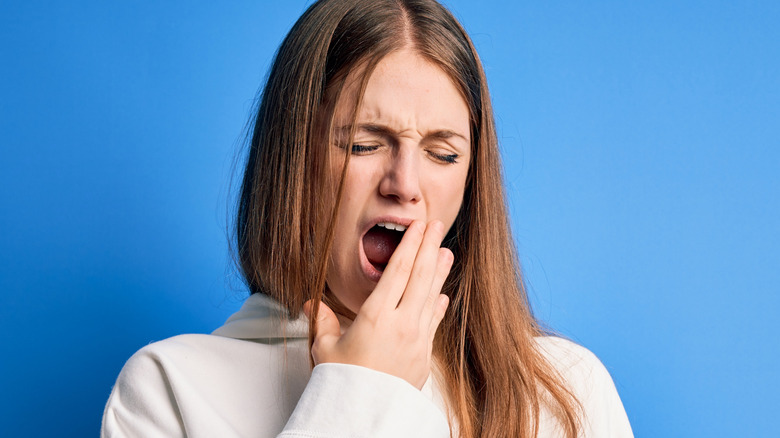Here's The Real Reason You Yawn
The human body can do some strange and involuntary things, from sneezing and burping to farting. What threads these responses together, however, are actions that lead to a reaction. A sneeze can be brought on by all manner of things, as can a burp or a fart. But with a reflex such as yawning, it's a little more mysterious.
More often than not, you'll catch yourself yawning in particular situations — either you're feeling extra tired or incredibly bored. But the reason why we yawn is a lot more complex than that. For a long time, it was believed that yawning was a sign that your body was in need of more oxygen. But, as Healthline notes, this is no longer the case.
In 2014, research published in the Physiology & Behavior journal (via Science Direct) found that the involuntary reflex of yawning has more to do with regulating temperature in the brain than providing your lungs with more oxygen.
You're more likely to yawn during a particular season of the year
As researchers from the University of Vienna found (via The Independent), yawning actually helps the body regulate its temperature. Similar to how sweat cools the outside of the body, a sharp intake of air — accompanied by increased heart rate and blood flow — can cool the brain down in an instant.
Per the study (via Science Direct), this all depends on the temperature of the air. Researchers tested the effects that summer and winter conditions had on its participants, with more experiencing moments of yawning in hotter temperatures than those in cooler ones. As concluded by the evidence, the study put forward the notion that yawning has more to do with thermoregulation than oxygen deprivation.
As for why you yawn when you're tired, this is because your brain struggles to maintain a constant temperature, according to Boston University's The Nerve Blog. So, to keep your thermoregulation at its optimum setting, the brain uses the yawn reflex to cool down.
Contagious yawning occurs for a totally different reason
But what about contagious yawning? Well, that's slightly more complicated. While the actual reason why humans that see others yawning suddenly feel the need to do it themselves is still up for debate, per Science Daily, it seems to be related to emotions rather than thermoregulation. According to a 2015 study published in the Personality and Individual Differences journal (via Science Direct), researchers at Baylor University discovered that the more empathy you have for others increased the chances that you'd contagiously yawn.
Another study conducted by the Universities of Turin and Pisa, in 2020 (via Frontiers in Psychology), found that the stronger a bond you share with someone, the more likely you are to "catch" a yawn. Researchers also discovered that when providing just the auditory sound of a yawn, it was "significantly more frequent between kin and friends than between strangers and acquaintances." In fact, even certain animals catch yawns, as Andrew Gallup, an evolutionary biologist at the State University of New York Polytechnic Institute, informed Science.org.
This is why yawning often makes your eyes water
Most of us will attempt to stifle a yawn if we're in a professional setting or listening to someone especially intimidating giving a speech since it's generally considered impolite. But our watery eyes tend to give us away no matter how well we hide the yawn. Funnily enough, the reason this happens is that you generally screw up your face while yawning, which pushes the tears out, rather than it being an involuntary physical response.
"[The] tightening of the facial muscles around the eyes when we yawn causes the pool of tears that normally coat our eyes (i.e. our tear film) to 'overflow,'" Dagny Zhu, MD, an eye surgeon with Nvision Eye Centers, explained to Well + Good. "Facial muscles also put pressure on the lacrimal gland, which 'squeezes' out tears." Weirdly, our eyes tearing up is a part of the cooling-off process too, similar to when we sweat during exertion to keep our bodies from overheating.
If your eyes don't tear up when you yawn, it could be because of an underlying autoimmune disease, which affects tear production. On the other hand, seasonal allergies, contact lenses, and certain makeup products can all cause the eyes to water more.
Is there such a thing as too much yawning?
As crazy as it might sound, you could actually be yawning too much, and worse still, it might be because something more serious is going on. Healthline reports that excessive yawning, although commonly attributed to tiredness or boredom, could signal that you're suffering from an underlying sleep disorder, are incredibly stressed out in your daily life, or are dealing with the side effects of medication typically used to treat mental health illnesses such as anxiety and depression, which are known as selective serotonin reuptake inhibitors (SSRIs).
Likewise, yawning too much can be linked to certain neurological disorders such as MS, liver failure, a brain tumor (thankfully, this is very rare), epilepsy, and even a heart attack, provided the other typical symptoms such as shortness of breath are all present too. There's generally no reason to panic unless other worrying issues are present, such as pain or discomfort. If you're concerned about the cause of excessive yawning, contact your doctor to make sure everything is okay. Likewise, try to get more sleep and stick to a regular schedule at bedtime.




